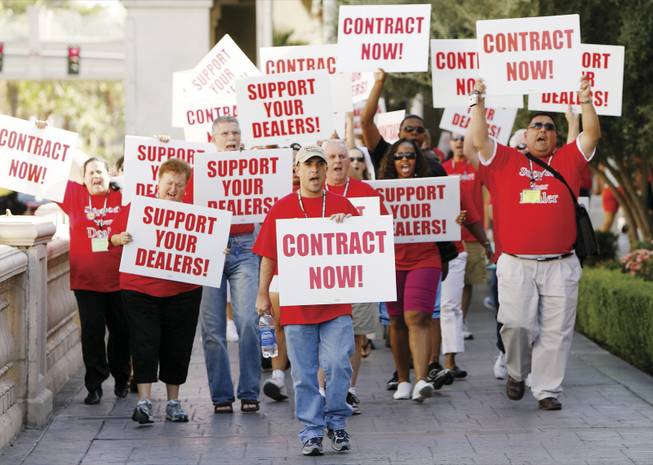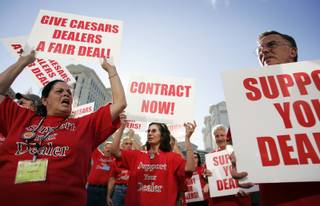
ASSOCIATED PRESS FILE
Supporters of a contract for Caesars Palace casino dealers rally outside the resort in September. Dealers, who voted to unionize in December 2007, and management have been unable to agree on a contract.
Monday, Jan. 18, 2010 | 2 a.m.
Sun Archives
- Caesars Palace dealers protest on Strip (9-17-2009)
- Wynn dealers persist in fight to topple tip-sharing policy (7-13-2009)
- Casino dealers bring tip-sharing case to federal court (7-10-2009)
- For Wynn dealers, deal slow to come (6-24-2008)
- Group opposing Wynn tip sharing plan to protest Culinary role (4-20-2008)
- Starbucks tips case gives hope to dealers (3-26-2008)
- No win-win for Wynn, former dealer (2-2-2008)
- Dealers sour on Caesars (11-19-2007)
- Under the radar, Caesars dealers push for union (10-11-2007)
Two years after casino dealers at Caesars Palace voted for union representation, they still don’t have a labor contract and relations with management have gone from bad to worse.
Caesars Palace executives have cemented their authority as the side holding most of the cards, proposing a list of new workplace rules and, in a shot heard throughout the Nevada gaming industry, asserting a right to dip into dealers’ tips.
Both sides filed complaints with the National Labor Relations Board in late December, alleging the other had failed to bargain properly. Like a go-between for a dysfunctional couple, an examiner with the NLRB has been trying to get the two sides to agree on dates for meetings.
Harrah’s Entertainment, which owns Caesars, contends that the union is unreasonably blocking its proposals. The company says its proposed changes are fair because they will bring dealers in line with other Harrah’s employees, union and nonunion.
What that means is the company isn’t offering dealers added benefits and is removing others, such as corporate 401(k) matches and vacation days for the longest-serving employees, notes the union representing the dealers, the Transport Workers Union Local 721.
“They never intended to negotiate,” Transport Workers Union Gaming Director Joe Carbon says.
“They never considered our very few proposals. They want to shove this down dealers’ throats as punishment for joining a union. And they’re getting away with it.”
Labor experts who aren’t involved in the fight say Harrah’s may succeed in imposing its will on the dealers. Unions have little power to pressure companies into signing a first contract because federal law doesn’t require employers to reach an agreement — only that they negotiate. Without the threat of strikes, which have become less likely in the sorry economy, employers can refuse to sign off on proposals they don’t like while adopting those they do, says Jeffrey Waddoups, a UNLV professor in labor management economics.
The dealers’ union contends Harrah’s violated labor law by refusing to bargain in good faith, but the difficulty in proving such an allegation is the very reason many unions are never able to obtain a labor contract, Waddoups says.
Caesars dealers refused to sign a proposed contract the company presented in August because it contained provisions giving management more control over their jobs — the kind of control afforded to most employers with nonunion employees.
One provision, since removed by management, would have required employees to deal cards for 80 minutes at a time with a 20-minute break, an increase from the industry standard of 60 minutes followed by a 20-minute break. This move, which Harrah’s has implemented in some casinos outside Las Vegas, allows casinos to operate with fewer dealers.
Other language in the proposed contract would have allowed Caesars to fire or discipline dealers for any aspect of the job, including interactions with customers or compliance with gaming policies and procedures.
By comparison, Culinary Union contracts covering tens of thousands of Las Vegas casino workers require that employers have “just cause” to fire workers. These contracts also contain a grievance and arbitration procedure enabling workers to defend their actions with the union’s help.
Caesars’ proposed contract stated that dealers aren’t subject to grievance and arbitration procedures. Instead, it says if the dealers don’t do their jobs or break the rules, they would be subject to discipline or termination at the “complete discretion” of Caesars Palace.
Most distressing for dealers was a statement in a management memo about Caesars’ right to divvy up dealers’ tips with other groups of employees if a “competitive need” arose.
The dealers figure “competitive need” translates into “cost-effective way to supplement employees’ earnings.”
Tips are a very sensitive topic on the Strip because they can account for a majority of front-line workers’ earnings.
After Steve Wynn moved to give a fraction of his dealers’ tips to their supervisors, dealers at Wynn Las Vegas filed a lawsuit and a complaint with the Nevada labor commissioner. The commissioner is expected to rule this year on whether Wynn broke a state law that forbids employers from taking “all or part of any tips” given to employees.
Wynn dealers say the policy reduced their earnings, before the recession, by more than 10 percent. Dealers, who earn little more than minimum wage, receive as much as 90 percent of their income from tips — earnings that have fallen in the worsening economy.
As of now, Caesars doesn’t intend to split dealer tips with other workers, says Marybel Batjer, Harrah’s vice president of public policy and communications.
The statement was intended to inform dealers of authority the company believes it has always maintained to distribute worker tips as it sees fit, she says. Some union workers in other departments across the company’s casinos, such as banquet workers, have union contracts that allow employers to split worker tips with management, she adds.
After Wynn initiated his controversial tip-sharing policy in 2006, executives with Strip competitors MGM Mirage and Harrah’s Entertainment assured dealers that they had no plans to give other workers a cut of the dealers’ tips. Knowing that dealers organized under a union at Wynn because of the tip scheme, executives at competing casinos hoped to quiet calls for unionization among their dealers.
Caesars’ statement on tips could help Harrah’s by chilling further union organizing efforts by dealers at other company-owned casinos, Waddoups says.
“The company has a big incentive not to reward anyone for unionizing,” he says. “If Caesars dealers end up getting a better deal, dealers would start to organize all over the place.”
And though giving employees a worse deal than they had before they unionized is an unusual outcome, the poor economy provides the company with a reason to do so.
Indeed, while the dealers say they unionized because they were seeking job security, Batjer counters: “Does anyone have job security these days?”
Transport yourself to the opulent and excessive Roman Empire at Caesars Palace. But the ever-changing Caesars Palace is far from ancient. The hotel and casino is constantly raising the bar for what visitors can expect in a Vegas resort experience.
Caesars Palace features 3,348 rooms and suites in five towers, including the new luxury boutique Nobu Hotel and Restaurant, which opened Feb. 4, 2013, in the totally remodeled Centurian Tower. Caesars features 129,000 square feet of gaming space, including the Strip’s largest poker room and a 250-seat sports book. Other amenities include about two dozen restaurants, a four-level shopping mall, four pools, a spa, Pure and Poetry nightclubs and Pussycat Dolls.
Dining options include restaurants from world-renown chefs Guy Savoy, Wolfgang Puck, Bobby Flay, Gordon Ramsay and, on Feb. 4, 2013, Nobu Matsuhisa.
You never know what characters you’ll run into at Caesars with regular performers like Jerry Seinfeld, Bette Midler, Elton John and maybe even the emperor himself.


Join the Discussion:
Check this out for a full explanation of our conversion to the LiveFyre commenting system and instructions on how to sign up for an account.
Full comments policy